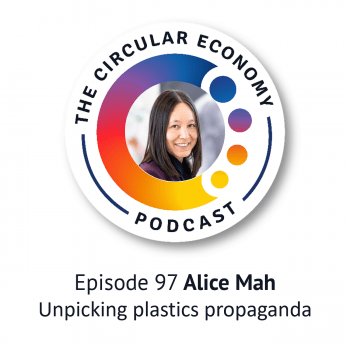Podcast: Play in new window | Download

In this episode, Catherine talks about plastics, a familiar circular economy topic, with someone from less familiar background…
Alice Mah is Professor of Sociology at the University of Warwick, in the UK, and she’ll help us unpick the propaganda about plastics and their role in a circular economy
Catherine came across Alice’s work when IEMA’s Transform magazine interviewed her about her latest book, Plastic Unlimited: How Corporations are Fuelling the Ecological Crisis and What We Can Do About It. (IEMA is the Institute of Environmental Management and Assessment.)
Alice unpacked some of the ways the plastics industry is trying to improve our perception of plastics, including how it tries to reframe the circular economy as a recycling issue. She highlighted other worrying aspects of how the petrochemicals industry is operating, and we’ll hear some of those.
Alice Mah holds a PhD in Sociology from the London School of Economics and was Principal Investigator of the large-scale European Research Council project “Toxic Expertise: Environmental Justice and the Global Petrochemical Industry” from 2015-2020. Her research focuses on environmental justice, corporate power, and the politics of green industrial transformations. Her next book the is Petrochemical Planet: Multiscalar Battles of Industrial Transformation.
In today’s conversation, Alice helps bust some myths around plastics and their potential role in a circular economy…
Myth #1 Plastics can support a Net Zero economy
Myth #2 Plastics are safe – in other words, it’s wrong to link plastics to health issues
Myth #3 Plastics are essential for our quality of life
Myth #4 Exporting plastic waste to low-income countries helps the country, and/or the local people, create value from that plastic
Myth #5 Plastic recycling can play an important role in the circular economy.
Podcast host Catherine Weetman helps businesses use circular, regenerative and fair solutions to do better, with less.
Stay in touch for free insights and updates…
Read on for more on our guest and links to the people, organisations and other resources we mention.
Links we mention in the episode:
- Alice Mah: https://warwick.ac.uk/fac/soc/sociology/staff/alice_mah
- Plastic Unlimited: How Corporations are Fuelling the Ecological Crisis and What We Can Do About It by Alice Mah, published by Polity Press (£14.99).
- Alice’s article in the Guardian: How the plastic industry turned the pandemic to its advantage https://www.theguardian.com/environment/2022/jul/24/how-the-plastic-industry-turned-the-pandemic-to-its-advantage
- Alice’s interview for IEMA Transform magazine https://www.iema.net/articles/a-continuing-crisis-corporations-owning-the-circular-economy-narrative#sts=Alice%20Mah%20tells%20Chris%20Seekings%20how%20plastics%20and%20chemical%20companies%20are%20taking%20control%20of%20the%20circular%20economy%20narrative
- Global Alliance for Incinerator Alternatives https://www.no-burn.org/ and their Zero Waste resources https://www.no-burn.org/going-zero-waste/
- Break Free from Plastic – which publishes the annual brand plastic waste audits https://www.breakfreefromplastic.org/
- Report Plastic & Health: The Hidden Costs of a Plastic Planet with Earthworks, GAIA, Healthy Babies Bright Futures, IPEN, Texas Environmental Justice Advocacy Services (t.e.j.a.s.), University of Exeter, and UPSTREAM https://www.ciel.org/project-update/plastic-and-human-health-a-lifecycle-approach-to-plastic-pollution/
About Alice Mah
Alice Mah is Professor of Sociology at the University of Warwick. She holds a PhD in Sociology from the London School of Economics and was Principal Investigator of the large-scale European Research Council project “Toxic Expertise: Environmental Justice and the Global Petrochemical Industry” from 2015-2020.
Her research focuses on environmental justice, corporate power, and the politics of green industrial transformations, which are the subjects of her two most recent books: Plastic Unlimited: How Corporations are Fuelling the Ecological Crisis and What We Can Do About It (Polity, 2022) and Petrochemical Planet: Multiscalar Battles of Industrial Transformation (Duke University Press, forthcoming).
She is the author of Industrial Ruination, Community, and Place, winner of the 2013 BSA Philip Abrams Memorial Prize, Port Cities and Global Legacies, and (with Thom Davies) Toxic Truths: Environmental Justice and Citizen Science in a Post-Truth Age.
Interview Transcript
Click here to open the transcript…
If you’re new to the circular economy, you might like the ‘getting started’ playlist. There’s also an interactive podcast index, making it easy to find episodes on each of the key circular economy strategies or for a specific market sector. And to dig deeper, please check out Catherine’s award-winning A Circular Economy Handbook, published by Kogan Page.
Please follow the Circular Economy Podcast and let us know what you think on LinkedIn, and if you love this episode, please leave us a review wherever you listen, or send an email…
